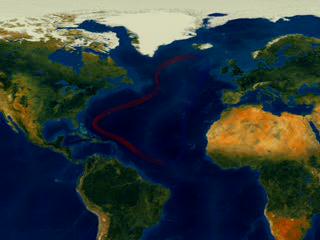Yes, the Gulf Stream is wind driven, but... The North Atlantic Current is water driven.
http://oceancurrents.rsmas.miami.edu/atlantic/north-atlantic.html...
The North Atlantic Current represents the bulk of the Gulf Stream continuation past its branch point. Mann (1967) shows the The North Atlantic Current as comprised of waters from the Slope Water Current and from the Gulf Stream. In his representation approximately 15 Sv are derived from the Slope Water Current with the remaining 20 Sv contributed by the Gulf Stream. The remaining 30 Sv head off to the north east. The NAC is strengthened by mixing interactions of the Gulf Stream and Labrador Current as well. Worthington had shown the NAC as part of a separate Northern gyre, however subsequent work later revealed that this hypothesis was incorrect and that the North Atlantic Current was indeed derived from the Gulf Stream. The North Atlantic Current is generally thought of as the end of the Gulf Stream, however it goes on to feed some of the major subarctic currents completing the poleward transport of tropical waters.
...
http://svs.gsfc.nasa.gov/vis/a010000/a010000/a010031/index.html
As part of the ocean conveyor belt, warm water from the tropical Atlantic moves poleward near the surface where it gives up some of its heat to the atmosphere. This process partially moderates the cold temperatures at higher latitudes. As the warm water gives up its heat it becomes more dense and sinks. This circulation loop is closed as the cooled water makes its way slowly back toward the tropics at lower depths in the ocean.
If the poles warm, it is possible that melt water from glaciers and the polar ice cap can shut off this circulation and interrupt this circulation system. The melt water is fresher and hence less dense than the ocean water it melts into, and thus the melt water will tend to accumulate near the surface. This layer of fresh water acts as an insulating barrier between the atmosphere and the normal ocean water. The water from the tropics can not release its heat to the atmosphere, and the circulation loop is interrupted. The mechanism has a positive feedback potential in that if the ocean circulation slows, then even less heat will make it to the higher latitudes re-enforcing an effect that will cool the climate at these higher latitudes.
(Follow the link for an illustrative animation.)
http://ipcc-wg1.ucar.edu/wg1/wg1-report.html...
- Based on current model simulations, it is very likely that the meridional overturning circulation (MOC) of the Atlantic Ocean will slow down during the 21st century. The multi-model average reduction by 2100 is 25% (range from zero to about 50%) for SRES emission scenario A1B. Temperatures in the Atlantic region are projected to increase despite such changes due to the much larger warming associated with projected increases in greenhouse gases. It is very unlikely that the MOC will undergo a large abrupt transition during the 21st century. Longer-term changes in the MOC cannot be assessed with confidence.
...